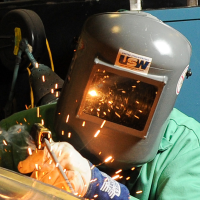Supreme Court Rules against Overtime Pay for Steel Workers Putting on Protective Gear
 (photo: United Steelworkers)
(photo: United Steelworkers)
The U.S. Supreme Court has rejected the claims of steel workers that they should be paid overtime for the time spent changing into and out of protective gear.
The case (Sandifer, et al. v. United States Steel Corporation [pdf]) began when Clifton Sandifer filed a class action case on behalf of 800 former and current workers of U.S. Steel Corp.
The plaintiffs insisted they were entitled under the Fair Labor Standards Act (pdf) (FLSA) to overtime for putting on and taking off flame-retardant jackets, pants, hoods, hardhats, work gloves, leggings, special boots, safety glasses, earplugs and respirators.
But the employer rejected the claim, saying nothing in the collective bargaining agreement (CBA) between U.S. Steel and the workers’ union mandated compensation for that time. Sandifer argued that the FLSA does require such compensation, and that FLSA overrides the CBA.
After failing to win their case before U.S. District Judge Robert Miller and the Seventh Circuit Court of Appeals, the plaintiffs appealed to the Supreme Court.
There, the nine justices sided with U.S. Steel (the decision was not completely unanimous because Justice Sonia Sotomayor refused to join the majority regarding a footnote describing precedent about the construction of FLSA exemptions).
“The object of §203(o) [of the FLSA] is to permit collective bargaining over the compensability of clothes-changing time and to promote the predictability achieved through mutually beneficial negotiation. There can be little predictability, and hence little meaningful negotiation, if ‘changing’ means only ‘substituting.’ Whether one actually exchanges street clothes for work clothes or simply layers garments atop one another after arriving on the job site is often a matter of purely personal choice….Applying the foregoing principles to the facts of this case, we hold that petitioners’ donning and doffing of protective gear at issue qualifies as ‘changing clothes’ within the meaning of §203(o),” Justice Antonin Scalia wrote for the court.
He added that of the 12 items of gear in question, only three (safety glasses, earplugs and a respirator) did not fit in the guidelines of “clothes,” but that the time spent putting on these items was minimal.
-Noel Brinkerhoff
To Learn More:
U.S. Supreme Court: Time Spent Donning, Doffing Gear Is Not Compensable (by Bajeerah LaCava, Mealey’s)
Steel Workers Lose High Court Overtime Battle (by Barbara Leonard, Courthouse News Service)
Sandifer et al. v. United States Steel Corporation (U.S. Supreme Court) (pdf)
Supreme Court to Decide if Steel Workers Deserve Overtime for Time Spent Changing Clothes (by Noel Brinkerhoff, AllGov)
- Top Stories
- Unusual News
- Where is the Money Going?
- Controversies
- U.S. and the World
- Appointments and Resignations
- Latest News
- Trump Orders ICE and Border Patrol to Kill More Protestors
- Trump Renames National Football League National Trump League
- Trump to Stop Deportations If…
- Trump Denounces World Series
- What If China Invaded the United States?






Comments